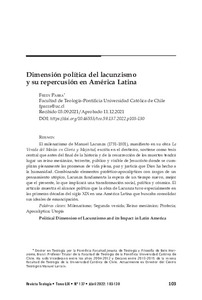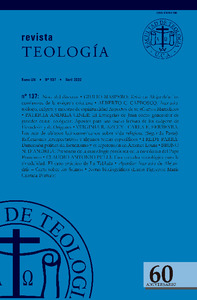Por favor, use este identificador para citar o enlazar este ítem:
https://repositorio.uca.edu.ar/handle/123456789/13829| Título: | Dimensión política del lacunzismo y su repercusión en América Latina Political dimension of lacunzismo and its impact in Latin America |
Autor: | Parra, Fredy | Palabras clave: | MILENARISMO; Lacunza, Manuel, 1731-1801; UTOPIA; PROFECIA; POLITICA; APOCALIPSIS | Fecha de publicación: | 2022 | Editorial: | Pontificia Universidad Católica Argentina. Facultad de Teología | Cita: | Parra, F. Dimensión política del lacunzismo y su repercusión en América Latina [en línea]. Teología. 2022, 59 (137). doi: 10.46553/teo.59.137.2022.p103-130. Disponible en: https://repositorio.uca.edu.ar/handle/123456789/13829 | Resumen: | Resumen: El milenarismo de Manuel Lacunza (1731-1801), manifiesto en su obra La
Venida del Mesías en Gloria y Majestad, escrita en el destierro, sostiene como tesis
central que antes del final de la historia y de la resurrección de los muertos tendrá
lugar un reino mesiánico, terrestre, público y visible de Jesucristo donde se cumplirán
plenamente las promesas de vida plena, paz y justicia que Dios ha hecho a
la humanidad. Combinando elementos profético-apocalípticos con rasgos de un
pensamiento utópico, Lacunza fundamenta la espera de un tiempo nuevo, mejor
que el presente, lo que implicará una transformación social, política y cósmica. El
artículo muestra el alcance político que la obra de Lacunza tuvo especialmente en
las primeras décadas del siglo XIX en una América Latina que buscaba consolidar
sus ideales de emancipación. Abstract: The Millenarianism of Manuel Lacunza (1731-1801), manifested in his work The Coming of the Messiah in Glory and Majesty, written in exile, maintains as a central thesis that before the end of history and the resurrection of the dead will take place a Messianic, terrestrial, public and visible kingdom of Jesus Christ where the promises of full life, peace and justice that God has made to humanity will be fully fulfilled. Combining prophetic-apocalyptic elements with features of a utopian thought, Lacunza bases the expectation of a new time, better than the present, which will imply a social, political and cosmic transformation. The article shows the political scope that Lacunza’s work had especially in the first decades of the 19th century in a Latin America that sought to consolidate its ideals of emancipation. |
Cobertura Temporal: | SIGLO XIX | URI: | https://repositorio.uca.edu.ar/handle/123456789/13829 | ISSN: | 0328-1396 (impreso) 2683-7307 (online) |
Disciplina: | TEOLOGIA | DOI: | 10.46553/teo.59.137.2022.p103-130 | Derechos: | Acceso abierto | Fuente: | Teología. 2022, 59 (137) |
| Aparece en las colecciones: | TEO - 2022 Tomo LIX nro. 137 |
Ficheros en este ítem:
| Fichero | Descripción | Tamaño | Formato | |
|---|---|---|---|---|
| dimensión-política-lacunzismo.pdf | 875,08 kB | Adobe PDF |  Visualizar/Abrir | |
| portada.pdf | 1,23 MB | Adobe PDF |  Visualizar/Abrir |
Visualizaciones de página(s)
94
comprobado en 27-abr-2024
Descarga(s)
91
comprobado en 27-abr-2024
Google ScholarTM
Ver en Google Scholar
Altmetric
Altmetric
Este ítem está sujeto a una Licencia Creative Commons

